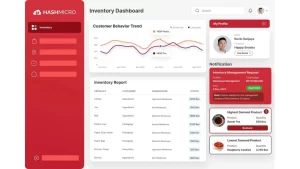Do you know that a poorly managed inventory can be the silent killer of your business’s profitability and operational efficiency?
Imagine facing constant overstocks, running out of products during critical sales periods, or wasting valuable resources on obsolete stock. These aren’t just minor inconveniences; they are significant threats that can lead to lost revenue, unsatisfied customers, and a tarnished business reputation.
A survey conducted by Coresight Research reveals that misjudgments in inventory, such as overbuying or choosing the wrong products, contribute to approximately 53% of unplanned markdown costs in retail.
This article explores 13 essential tips on how to streamline your inventory management and safeguard your business against these perilous pitfalls.
Key Takeaways
|
Table of Contents

Why Inventory Management is Important for Business
Understanding the nuances of inventory management is crucial for maintaining inventory accuracy and enhancing the effectiveness of supply chain management. This critical business function ensures that product sourcing strategies are well-informed and that inventory turnover rates remain optimal to sustain business operations.
At the heart of effective inventory management lies the ability to synchronize product flow with business demands, directly impacting operational efficiency and profitability. Adopting robust practices allows you to keep pace with market changes and ensures that the necessary products are always available to meet customer demands.
Key aspects of inventory management include meticulous tracking of stock keeping units (SKUs), monitoring quantities on hand, and keeping detailed records of product costs and retail pricing. These elements form the backbone of strategic decision-making in supply chain operations.
| Component | Description | Impact on Business |
| Inventory Accuracy | Ensures stock levels match records | Reduces financial losses due to inventory discrepancies up to 25% |
| Product Sourcing | Selective procurement aligning with business goals | Improves the quality and cost-effectiveness of inventory by 15-30% |
| Inventory Turnover | Rate at which stock is used or sold | Optimizes storage and reduces holding costs by 20% |
| Supply Chain Integration | Real-time data sharing across platforms | Enhances operational responsiveness and agility up to 35% |
Read also: Pharmacy Inventory Management System
13 Tips on How to Streamline Inventory Management
Effective inventory management holds the key to scalable business growth, allowing firms to avoid common pitfalls such as overstocking or underordering. Here are several tips to maximize your inventory management efficiency.
- Implement an Inventory Management Software
Automating your inventory management can drastically reduce human errors and save time. Automated inventory management tools tracks stock levels in real time, alerting you when supplies are low and need replenishing. This eliminates the need for manual stock takes, which can be time-consuming and prone to error.
Additionally, by integrating MRO inventory automation, businesses can optimize their inventory levels, ensuring that critical supplies are always available when needed, which further enhances operational efficiency and minimizes downtime.
By integrating your inventory software with Point-of-Sales (POS) and purchasing, you can maintain a constant overview of stock levels and reorder when stocks reach the minimum level, ensuring you never run out of critical items.
One of the best cloud inventory software in the Philippines is HashMicro. Offering a comprehensive software solution with complete features, it helps any business to maximize their inventory management.
HashMicro inventory software has many potentials for businesses to grow. To understand more about HashMicro inventory software, you can donwload the price scheme below.

- Adopt Just-In-Time (JIT) inventory
Just-In-Time inventory aims to reduce the costs associated with holding stock by receiving goods only as they are needed in the production process. This approach minimizes the amount of inventory that must be stored and managed, reducing overhead costs and increasing efficiency. However, it requires precise coordination with suppliers and an accurate demand forecasting system to avoid stockouts that could halt production.
- Regularly review stock levels
Conducting regular reviews of your stock helps identify slow-moving or obsolete items that can tie up capital and storage space. Regular analysis allows you to adjust purchasing decisions based on sales trends and customer demand, optimizing your inventory levels. This proactive approach ensures that your capital isn’t tied up in unnecessary stock and helps in maintaining a lean inventory.
- Improve demand forecasting
Accurate demand forecasting is crucial for effective inventory management for e-commerce. By analyzing sales trends, market conditions, and seasonal fluctuations, businesses can predict future product demands more accurately. This enables better decision-making about stock levels, reducing both overstock and stockout situations. Advanced forecasting tools that utilize AI and machine learning can further enhance this accuracy, making your inventory management even more efficient.
- Use ABC analysis
Segment your inventory using ABC analysis to prioritize management efforts based on the impact on total inventory cost. ‘A’ items are high-value with a low frequency of sales, ‘B’ items are moderate value and moderate sales frequency, and ‘C’ items are low value but high frequency. This method helps focus your resources on managing the most impactful items, reducing the time and capital spent on less critical products.
- Implement cycle counting
Instead of a full physical inventory count, implement cycle counting where a subset of inventory, in specific locations, is counted on a rotating schedule. This approach can identify and correct discrepancies more frequently and maintain accurate inventory reports without the disruption of a full inventory count. It’s a less disruptive way to ensure accuracy in stock levels throughout the year.
- Enhance supplier relationships
Building strong relationships with your suppliers can lead to more reliable lead times, better prices, and preferential treatment in critical situations. Regular communication and joint efforts to improve processes can help in streamlining the supply chain, thereby enhancing inventory management. This collaborative approach can also open up opportunities for drop shipping, which reduces the need to hold large amounts of stock.
- Optimize warehouse layout
Optimizing the layout of your warehouse can significantly enhance efficiency in inventory management. Arrange frequently sold items near the packing area and ensure that paths are clear for easy access and movement. This reduces picking time and effort, speeding up the process of getting products to your customers. Consider technologies like automated storage and retrieval systems (AS/RS) to maximize space and improve retrieval times.
- Employ mobile technology
Using mobile devices equipped with barcode scanners and inventory management apps can increase the accuracy of tracking inventory. This technology allows real-time updates to your inventory system directly from the warehouse floor, enhancing data accuracy and employee productivity. Mobile technology also facilitates easier and faster stock takes and order processing.
- Set par levels
Setting par levels – the minimum amount of product that must be on hand at all times – ensures that you never run out of stock but also that you don’t overorder. Par levels should be reviewed regularly to adjust for changes in demand, seasonality, and other factors that can influence inventory needs. This practice simplifies ordering processes and can be automated in many inventory management systems.
- Focus on quality control
Implementing rigorous quality control procedures can prevent defective goods from entering and remaining in your inventory. This reduces the costs associated with returns and lost sales due to poor quality. Regular audits and checks at different stages of the inventory process ensure that issues are caught early and addressed promptly, maintaining the integrity of your stock.
- Utilize dropshipping
Dropshipping allows you to sell products directly from suppliers to your customers without holding them in your inventory. This model can significantly reduce inventory costs and risks associated with unsold stock. It’s ideal for expanding product offerings or testing new markets with minimal investment. However, you must ensure that your suppliers are reliable and can meet your standards for customer service and delivery times.
- Train your staff
Well-trained staff are essential for effective inventory management. Ensure that all employees understand how to use inventory tools and systems and are aware of your inventory policies and procedures. Regular training and updates can improve operational efficiency and accuracy in inventory management, directly impacting customer satisfaction and business success.
Implementing another software, like manufacturing inventory software, can help to streamline your inventory management.
Conclusion
In the fast-paced commercial landscape of the Philippines, to optimize the inventory process is tantamount to setting the stage for monetary success. Your business strategy should prioritize the adoption of a reliable inventory management system. With such an automated system in place, every item on your shelves is accounted for, from arrival to sale, fueling both efficiency and customer satisfaction.
One of the best options available is HashMicro’s inventory management software. Trusted by more than 1750 clients, HashMicro offers advanced software to streamline your inventory management to the next level. Try the free demo now!























